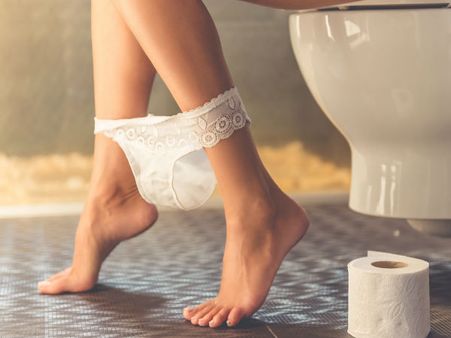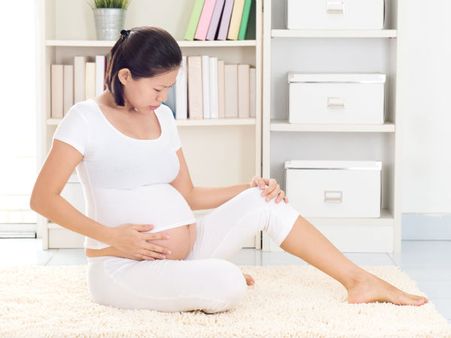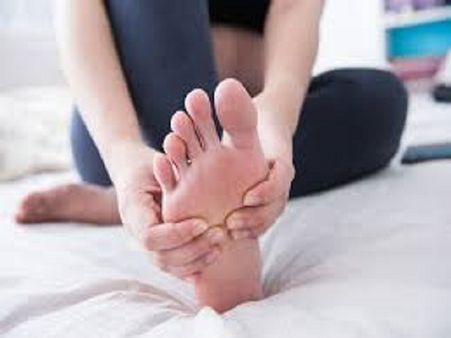Just In
- 8 hrs ago

- 10 hrs ago

- 11 hrs ago

- 11 hrs ago

Don't Miss
- Movies
 Palang Tod OTT Release Date: When & Where To Watch Ullu App Web Series Siskiyaan Season 3? Is New Season On Ca
Palang Tod OTT Release Date: When & Where To Watch Ullu App Web Series Siskiyaan Season 3? Is New Season On Ca - Sports
 DC vs GT IPL 2024: Why Shubman Gill Held Back Spinner R Sai Kishore Till 19th over?
DC vs GT IPL 2024: Why Shubman Gill Held Back Spinner R Sai Kishore Till 19th over? - Travel
 Escape to Kalimpong, Gangtok, and Darjeeling with IRCTC's Tour Package; Check Itinerary
Escape to Kalimpong, Gangtok, and Darjeeling with IRCTC's Tour Package; Check Itinerary - News
 Explained | Who Is Karen McDougal, Key Witness In Trump's Hush Money Trial?
Explained | Who Is Karen McDougal, Key Witness In Trump's Hush Money Trial? - Finance
 DCB Bank Q4 Results: PAT Grew 9% To Rs 156 Cr, NII Jumps 4.5%; Dividend Declared
DCB Bank Q4 Results: PAT Grew 9% To Rs 156 Cr, NII Jumps 4.5%; Dividend Declared - Technology
 OPPO Find X7 Ultra Camera Deep-Dive: Pushing the Boundaries of Photography on a Smartphone
OPPO Find X7 Ultra Camera Deep-Dive: Pushing the Boundaries of Photography on a Smartphone - Education
 MP Board Class 10th, 12th Results 2024, Know Alternative Ways to Check Your Result
MP Board Class 10th, 12th Results 2024, Know Alternative Ways to Check Your Result - Automobiles
 Aston Martin Vantage Launched In India At Rs 3.99 Crore
Aston Martin Vantage Launched In India At Rs 3.99 Crore
Reasons For Lack Of Sleep During Pregnancy
One of the most common advices that a pregnant woman receives from friends and family is that she must get as much sleep as possible. Rest is very important when you are pregnant.
It helps you cope with the astounding amount of changes that your body goes through during pregnancy. It also helps your unborn child in growing up healthy and stress free. Also, keep in mind that once your baby arrives, you can very well say good bye to a good night's sleep.

Sleeping well during pregnancy is an advice easier given than practiced. If you see a pregnant woman who claims to be able to sleep as comfortably as she did earlier, tell her that she is the luckiest pregnant woman around. Most pregnant women deal with various problems that make sound sleep difficult, if not impossible.
Today, we shall talk about the various problems that pregnant women face while sleeping. The problems range from a simple heartburn to the very terrifying sleep apnoea. We shall also talk about the ways in which the problems can be tackled. Let's dive in.

The Constant Need To Pee
If
you
are
pregnant,
you
are
no
stranger
to
the
frequent
calls
of
nature
that
you
need
to
answer.
It
is
most
commonly
seen
in
women
who
are
in
the
third
trimester
of
their
pregnancy.
This
incessant
need
to
pee
is
triggered
by
the
high
levels
of
the
hormone
hCG,
which
is
seen
when
one
is
pregnant.
The
need
to
use
the
bathroom
can
arise
at
any
point
of
time,
day
or
night.
Another reason for the increased urination is the fact that your kidneys now filter more than 50 percent extra blood than usual. You are literally urinating for two now.
As the pregnancy progresses, the growing uterus pushes down on the bladder, leaving very little space to store the urine. This makes you want to void urine more often.
How To Tackle The Problem:
Space the amount of liquids you drink in a way that you drink the most in the first half of the day. Drink lesser amount of fluids when it is bed time. Nevertheless, you will still need to visit the bathroom at least a couple of times during the night.
Keep a night light switched on in your bathroom, so that you can do your business without the risk of falling down or injuring yourself. Switching the normal lights on may cause you to have trouble in going back to sleep.

Discomfort
Discomfort is a constant companion of a pregnant woman. This is especially true in the second and third trimesters of pregnancy.
The discomfort during sleep can be contributed by the fact that once pregnant, it is not possible to find a comfy way to sleep. Even the people who sleep on their backs are advised to sleep on the sides, making it difficult to sleep well in an unfamiliar position.
Sleeping on the back is especially harmful, as in this position, the womb and the baby exert pressure and this puts weight on the vein that takes blood from the lower half of your body to your heart.
How To Tackle The Problem:
Sleeping on the side will give you the best chances of being comfortable while sleeping. Choose your left side, as it boosts the circulatory system. This position is also considered the safest for the baby too.
If you sleep this way, you will ensure that you have lesser swelling of extremities and this will also help your kidneys function normally. You can also use pillows to aid your sleeping position.

Heart Burn
Heartburn is something that most pregnant women have to deal with. This can happen at any given point of the day, but it increases during the night, as lying down brings up more gastric reflux.
This happens as the hormones released during the pregnancy relax the sphincter muscles that are inside the stomach. This causes the acids in the stomach to come out as heart burn.
How To Tackle The Problem:
Avoid food items that contain greasy, spicy and oily things in them. Try having smaller meals throughout the day. Always finish the last meal of the day two hours before you go to sleep. While sleeping, prop yourself up using pillows. If you still have a problem, talk to your doctor and have safe antacids as prescribed by your doctor.

Insomnia
Insomnia or inability to sleep can strike you at any time. It can happen due to various reasons like pregnancy hormones and anxiety. Most pregnant women face this problem at some point or the other and it can be very frustrating when you face it with other problems of pregnancy.
How To Tackle The Problem:
Try having a proper routine before you go to sleep, which will help you to wind down at the end of the day. Good sleep hygiene will also help you sleep better. Talk to your doctor and see if medications can help you, if you haven't been able to sleep for a long time.

Leg Cramps
Most pregnant women have to deal with leg cramps, as they enter the second and the third trimesters of their pregnancy. While it is not definite as to what causes these cramps, it has been thought that it is because of the blood vessels in the leg being compressed. This can be due to the extra weight you carry while you are pregnant. It is commonly more noticeable in the night than in the daytime.
How To Tackle The Problem:
Doctors say that food rich in calcium and magnesium will help in reducing the occurrence of leg cramps. Consume foods like milk, yoghurt, soy beans and bananas. Ask you doctor if you need supplements.
Drinking lots of water will help you too. Support hoses also help in reducing the leg cramps. If there is a frequent occurrence of the leg cramps, be sure to bring it to the notice of your doctor, as it may be due to blood clot.

Nasal Congestion
With the pregnancy, the hormones - oestrogen and progesterone - increase dramatically in your body. This causes the increase in blood volume. This increase in the blood volume, including the nasal membranes, can cause you to suffer from a blocked nose. You also have post-nasal drip towards the end of your pregnancy, leading you to cough in the night.
How To Tackle The Problem:
Use nose strips and nasal sprays in the night-time to reduce discomfort. You may also use decongestants and nasal sprays that contain steroids and are deemed safe by your doctor.

Sleep Apnoea
With the stuffy nose in the second and third trimesters, you can have a disturbed sleep due to sleep apnoea and snoring. The increase in weight will contribute to it too. High blood pressure and the chance of gestational diabetes are also linked with sleep apnoea and snoring. Make sure that you talk to your doctor about it.
How To Tackle The Problem:
Get a humidifier for your room which has a cool mist. Nasal strips can also help with the sleep apnoea and snoring. A simple trick of propping yourself up on a few pillows can help you a lot too.

Restless Leg Syndrome
Many women complain of suffering from the restless leg syndrome when they are in their third trimester. It is a syndrome that has a combination of symptoms like being extremely uncomfortable, a crawling feeling up your legs and an irritating urge to keep your legs moving. Restless leg syndrome, or RLS, can leave you unable to sleep and can tap away all your energy.
How To Tackle The Problem:
RLS is thought to be caused by anemia that is because of iron deficiency. Talk to your doctor about it. He will test your blood and determine if you need iron supplements or not.
Deficiency
of
magnesium
or
vitamin
D
can
also
cause
RLS.
Any
such
deficiency
will
be
treated
with
supplements
on
your
doctor's
advice.
Exercising
daily
also
helps
in
relieving
the
discomfort.
Yoga,
acupuncture
and
meditation
are
seen
to
be
effective
too.
Another
trick
that
might
be
useful
is
to
apply
cold
or
hot
packs
on
your
legs
just
before
you
go
to
sleep.
-
 healthSolar Eclipse 2024: Dos and Don'ts for Pregnant Women During Surya Grahan
healthSolar Eclipse 2024: Dos and Don'ts for Pregnant Women During Surya Grahan -
 healthLunar Eclipse 2024: Dos And Don'ts For Pregnant Woman During Chandra Grahan
healthLunar Eclipse 2024: Dos And Don'ts For Pregnant Woman During Chandra Grahan -
 fashionDeepika Padukone-Ranveer Singh Announce Pregnancy: 6 Maternity Outfit Ideas For The Modern Mom-to-Be
fashionDeepika Padukone-Ranveer Singh Announce Pregnancy: 6 Maternity Outfit Ideas For The Modern Mom-to-Be -
 healthLate Singer Sidhu Moose Wala's Mother Is Pregnant Through IVF, Know What It Is And How To Prepare For It
healthLate Singer Sidhu Moose Wala's Mother Is Pregnant Through IVF, Know What It Is And How To Prepare For It -
 insyncVirat Kohli And Anushka Sharma Name Their Baby Boy 'Akaay', Know What This Beautiful Name Means?
insyncVirat Kohli And Anushka Sharma Name Their Baby Boy 'Akaay', Know What This Beautiful Name Means? -
 pregnancy parentingMaternal Health Awareness Day 2024: 15 Foods That Boost Maternal Health
pregnancy parentingMaternal Health Awareness Day 2024: 15 Foods That Boost Maternal Health -
 pregnancy parentingFrom Contractions To Water Breaking: Knowing When It's Time For The Hospital During Pregnancy
pregnancy parentingFrom Contractions To Water Breaking: Knowing When It's Time For The Hospital During Pregnancy -
 pregnancy parentingBirth Control Pills Can Affect This Primary Function In Women: Find Out What
pregnancy parentingBirth Control Pills Can Affect This Primary Function In Women: Find Out What -
 pregnancy parentingTwo Wombs, Four Hearts: US Mom's Extraordinary Double Uterus Pregnancy
pregnancy parentingTwo Wombs, Four Hearts: US Mom's Extraordinary Double Uterus Pregnancy -
 healthExclusive: A Pregnant Mom Can Posses These Maternal, Fetal Health Risks If Exposed To Air Pollution
healthExclusive: A Pregnant Mom Can Posses These Maternal, Fetal Health Risks If Exposed To Air Pollution -
 pregnancy parentingDelhi Air Pollution: Pregnant Women Must Follow These 4 Things!
pregnancy parentingDelhi Air Pollution: Pregnant Women Must Follow These 4 Things! -
 pregnancy parentingDelhi Air Quality Crisis: How Air Pollution Can Affect Unborn And Newborn Babies? Precaution Tips For Pregnant
pregnancy parentingDelhi Air Quality Crisis: How Air Pollution Can Affect Unborn And Newborn Babies? Precaution Tips For Pregnant


 Click it and Unblock the Notifications
Click it and Unblock the Notifications



